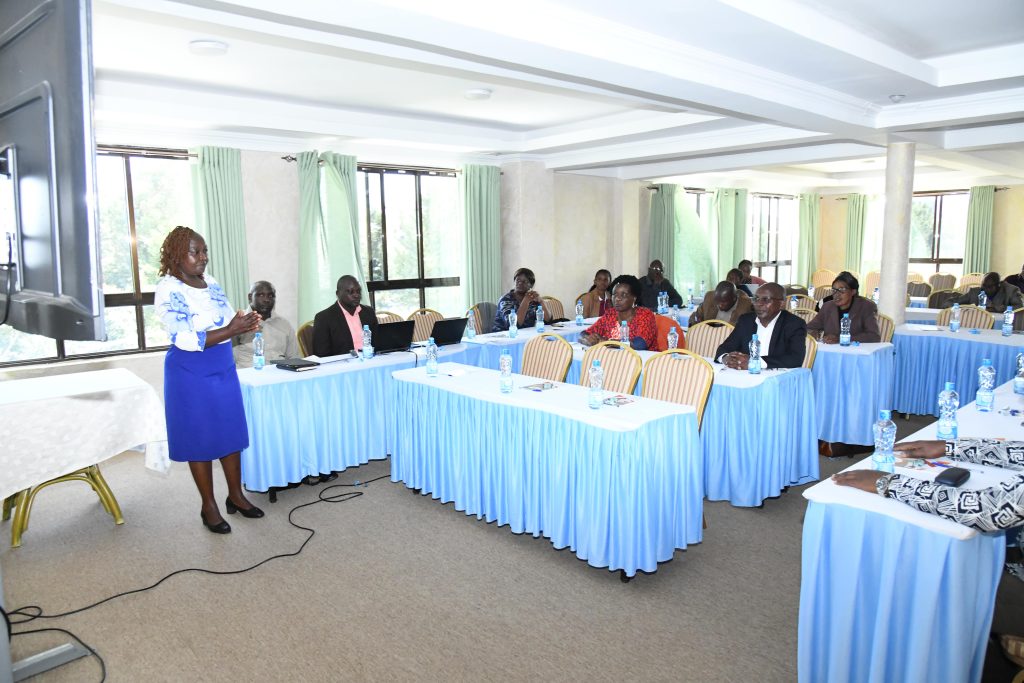Kericho County Engages Private Sector to Combat TB in Workplaces

At Sunshine Hotel in Kericho County, stakeholders share ideas and goals for a healthier, TB-free community. The ongoing workshop on Workplace and Public-Private Mix for TB Control has brought together representatives from diverse sectors including St. Kizito School for the Deaf, Kenya Prisons – both women and medium, Kapkatet Kenya Medical Training College (KMTC), and Kericho County BodaBoda Riders Association, all committed to one mission: ending TB in workplaces and beyond.
The workshop, organized by Healthcare for Generations and supported by Red Cross Kenya through Global Fund in partnership with the National TB Program, highlights a growing understanding that TB is not just a health issue, it’s a workplace and economic concern.
When individuals suffer from TB, productivity plummets, families face financial hardships, and businesses bear the weight of absenteeism and escalating healthcare costs. In this workshop, participants are working to change this narrative.
For Kippngetich Edwin, the Chairman of the Kericho Boda Boda Riders Association, this issue hits close to home. “Many of my members are informal workers. They spend hours on the road, interacting with people every day. If one of us gets TB, it affects everyone, the family, the community, and the business,” he shares passionately. Edwin believes that creating awareness among Boda Boda riders and making TB screening accessible could save lives and livelihoods.
Kipchimchim Group, with its extensive reach across various industries including, Tea Factories, West Valley Sugar Company, Kipchimatt Supermarkets, Construction Companies as well as Logistics and Warehousing, has taken a proactive stance in this fight. “Our commitment to the well-being of our employees means addressing TB not just as a health issue, but as a broader economic concern,” said Faizah Jepkorir, Communications Officer from Kipchimchim Group attending the workshop. The conglomerate has implemented workplace TB screenings, health education sessions, and partnerships with healthcare providers to ensure comprehensive care for their workforce.
“With over 5,000 employees, we are committed to prioritizing workforce well-being. This meeting on workplace health and TB awareness reinforces our responsibility to equip our team with knowledge and mitigation measures. The training will ensure a healthier, more productive environment for our workforce across all our businesses,” she adds.
At St. Kizito School for the Deaf, the focus has been on inclusive health education. Jane Chepngetich Molel, a coordinator at the school, emphasized that “communication barriers often mean that TB information doesn’t reach everyone, especially people living with hearing disabilities. We are here to change that.” With proper tools, TB screening, and health literacy programs tailored for the deaf community, St. Kizito is ensuring no one is left behind in the fight against TB.
Prisons, with their confined spaces, are high-risk environments for TB transmission. Bernard Mosima, an officer at the Kericho Medium prison, highlighted their efforts to screen inmates and staff. “TB spreads quickly in closed environments. This workshop is helping us learn new strategies to improve early detection and treatment in prisons,” he said.
Meanwhile, educational institutions such as KMTC are also taking the opportunity to champion youth involvement in TB awareness and prevention. Dr. Wanjiku Mutai from KMTC noted, “Our students are the future health workers. Training them to integrate TB screening in community outreach programs will have a ripple effect. The youth are our agents of change.” The workshop underscores an essential truth: combating TB requires a multi-sectoral approach.
Other stakeholders present include Black Tulip, Tebesonik Tea Estate, Seculance Security Farm, Mosop Dairy, Sigowet/soin, Kenya Highlands University, Kericho Tea Secondary, Kenya Police, Kericho Technical Training College, Naivas supermarket, KYDESA and Kaywat Tea Estate, REESOK
The National TB Program (NTP) is at the forefront, but the private sector, schools, prisons, and informal workers all have pivotal roles to play. Employers have the responsibility to ensure safe working environments while employees can advocate for regular screenings and treatment access. Grace Kaigwa a field officer at the Healthcare for Generations, emphasized the importance of collaboration. “We cannot eliminate TB if we work in silos. This workshop demonstrates the power of partnerships—public and private entities coming together to share responsibilities and resources.”
Just like Kisumu and Migori Counties, the Kericho County initiative is a clear example of how the fight against TB can be won when everyone comes to the table. With employers promoting TB control measures in workplaces and communities, workers getting the support they need, and local leaders pushing for awareness, Kericho is taking a bold step toward ending TB for good.














